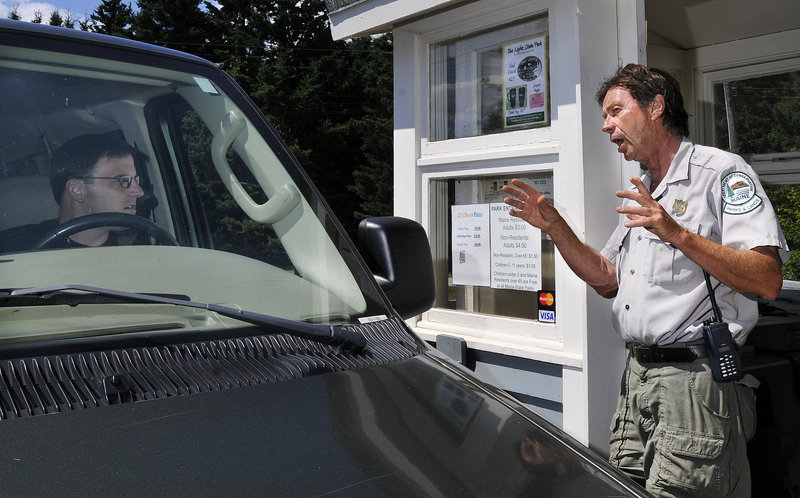CAPE ELIZABETH – Jim Flahaven of South Portland was relaxing on the rocks at Two Lights State Park late Thursday afternoon when a park ranger beckoned him away from the water.
At first, Flahaven thought he was just too close to the crashing surf. But the ranger insisted that he climb up from the rocks, then told him and others to leave the park because of an emergency.
“We were joking that it was a tsunami or terrorists. It can’t be a shark because nobody swims there,” Flahaven said.
When he saw a ranger pulling a big stick out of his truck, Flahaven concluded it was a fox alert. Park rangers shut down Two Lights shortly after spotting a gray fox acting strangely about 5:30 p.m.
“There was a fox running back and forth near the office and it was acting agitated,” said Ron Ahlquist, a ranger at the oceanside park. “We kept hearing it make that yelping, squealing kind of sound.” Then, the animal disappeared into dense underbrush.
The decision to evacuate shows new caution among rangers in dealing with animals that could be rabid. A week earlier, the park was evacuated after a rabid fox attacked a visitor and her 3-year-old son — as well as Ahlquist’s shoes.
An animal control officer shot the gray fox, a species that is common in the park and throughout Cape Elizabeth but usually avoids humans.
State health officials tested the carcass and found the fox had the deadly rabies virus. The infection typically spreads when a diseased animal — shortly before it dies — attacks another animal or a person.
People must take a course of medicine immediately after being bitten to avoid contracting the disease.
On Friday, rangers had a sign at the entrance to the park reminding visitors not to feed or touch wild animals. Rangers were informing visitors as they came in to be alert for any unusual behavior by foxes.
“If you see a fox, tell us. If you see any wildlife acting abnormal, report it to the ranger,” Ahlquist repeated.
The rangers, in turn, assess whether an animal may be rabid. If they decide it may be, they notify the animal control officer and, probably, shut down the park.
Betty Honan of South Portland, who visited the park with her two nieces from Georgia on Friday, said she was a little unsettled by the incidents. When reminded of the foxes, she glanced warily at a clump of nearby beach roses.
She said it would be good if the diseased animals could be removed because the park is popular with children. “It would be a shame to have people not come here,” she said.
For now, officials plan to let the disease run its course, while keeping watch for sick animals. The primary species affected are skunks, raccoons, foxes and bats, said state epidemiologist Stephen Sears.
“Around this time of year, we see a lot of rabies,” Sears said. “We’re not seeing any more this year than other years.”
He said the state lab tests 80 to 90 animals a year that have rabies.
The best strategy remains avoiding wildlife, especially nocturnal animals that are out during the day, he said, and making sure pets are vaccinated.
Representatives from the Maine Center for Disease Control and Prevention held training for rangers at Two Lights and Crescent Beach state parks this week, and may hold another for rangers who were off duty, said park Manager John Polackwich.
Claire Smith of Portland said she visited the park the day after the fox attack. She was there again Friday.
“If I was up near the woods I would have been more concerned than I am right here,” Smith said as she took in the expansive view of the ocean from her perch where the grass meets the rocky shore. “I figure if there’s a problem, they’d let us know at the gate.”
Staff Writer David Hench can be contacted at 791-6327 or at:
dhench@pressherald.com
Send questions/comments to the editors.



Success. Please wait for the page to reload. If the page does not reload within 5 seconds, please refresh the page.
Enter your email and password to access comments.
Hi, to comment on stories you must . This profile is in addition to your subscription and website login.
Already have a commenting profile? .
Invalid username/password.
Please check your email to confirm and complete your registration.
Only subscribers are eligible to post comments. Please subscribe or login first for digital access. Here’s why.
Use the form below to reset your password. When you've submitted your account email, we will send an email with a reset code.